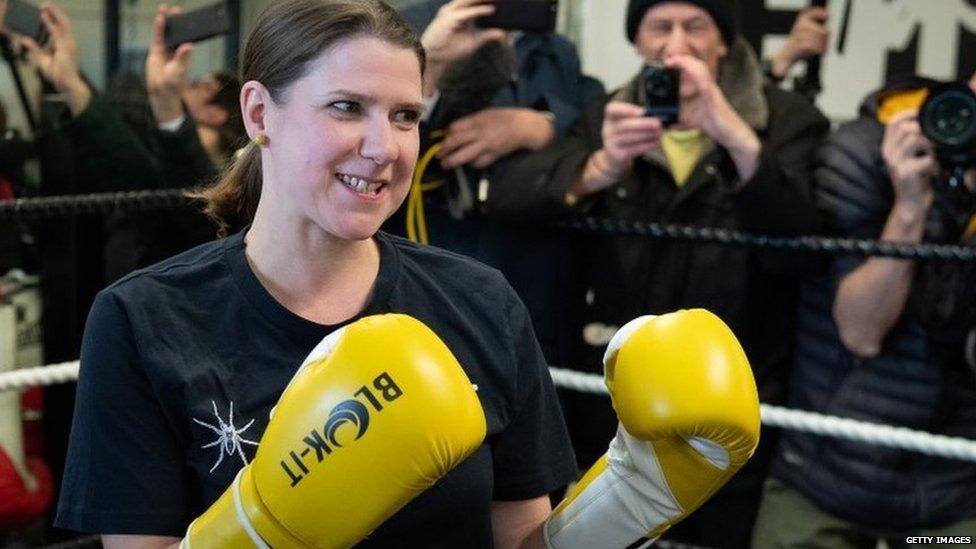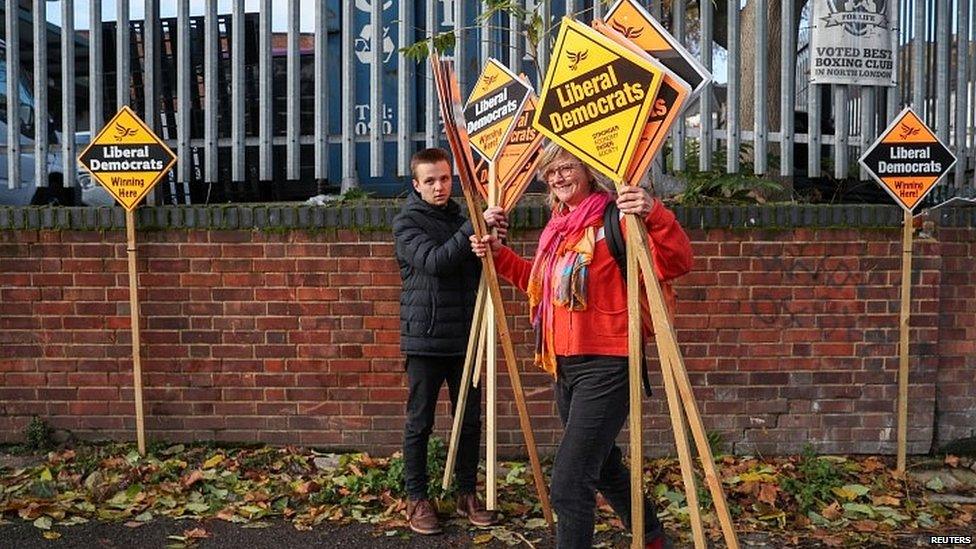General election 2019: Jo Swinson insists there will be no deals with Labour
- Published
- comments

Jo Swinson said she was up for the fight against Jeremy Corbyn
Jo Swinson has rejected calls for the Lib Dems to pull out of seats held by Labour candidates opposed to Brexit.
The Lib Dem leader is under mounting pressure after two of her own candidates withdrew saying they did not want to split the pro-Remain vote.
The Lib Dems do have an electoral pact with the Greens and Plaid Cymru.
But Ms Swinson said she would not do Labour any favours as Jeremy Corbyn's party was "not a party of Remain" and was "trying to deliver Brexit".
In the past 24 hours, the Lib Dem candidates in Canterbury and High Peak have both pulled out, citing concerns they may take votes away from Labour and allow pro-Brexit Conservatives to win in the marginal seats.
In both constituencies, Labour won by a narrow margin in the last election - with Rosie Duffield prevailing in Canterbury by 187 votes.
Former journalist Tim Walker, who was due to represent the Lib Dems in the Kent city, said he wanted "no part" in helping Ms Duffield lose and potentially "gift-wrapping" the seat for the Conservatives.
"I couldn't live with myself if, on election night, I was standing there looking rather gormlessly as Rosie looked rather sad and in front of us both was a Brexiteer who we both had a massive ideological problem with, she was raising her hands in delight," he told the BBC.
Mr Walker is facing potential disciplinary action while the Lib Dems have said they will still contest the seat and nominate a replacement candidate by Thursday's deadline. The Kent Messenger, external said local councillor Claire Malcolmson was being lined up.
'Paper candidate'
Guy Kiddey, the party's candidate in High Peak, has appealed to Ms Swinson to reach some kind of local electoral arrangement with Jeremy Corbyn, saying it would have the backing of hundreds of Lib Dem and Labour candidates.
The Lib Dems have said they will find a new candidate in the Derbyshire seat, after it emerged Mr Kiddey had yet to submit the paperwork required to stand.
Mr Kiddey told the BBC he was prepared to run as a "paper candidate" in order to give people who "would never vote for Labour" an alternative. But he suggested, in such a scenario, he would "take his foot off the accelerator" and recommend people vote for his Labour opponent.

The Lib Dems are standing down in a handful of seats, such as Brighton Pavilion and Beaconsfield
"Let's face it, if the party leadership cannot agree on this kind of thing, it falls to the candidates," he told BBC News. "The candidates are doing the right thing. It is a noble action."
Speaking during a visit to a gym in north London, Ms Swinson said she was "proud" of her party's role in the "Unite to Remain Alliance" - an agreement between pro-Remain parties spanning some 60 seats in England and Wales.
This will see the Greens and Plaid Cymru step aside in seats being defended by the Lib Dems and key targets for Ms Swinson's party. As a quid pro quo, the Lib Dems will not oppose several anti-Brexit campaigners such as the Greens' Caroline Lucas and former Tory Dominic Grieve.
'Absent'
But she said Labour had been "absent" from these discussions and the Lib Dems would not do them any favours.
"We will be standing in seats everywhere, apart from where we have reached those agreements with Remain parties...and that is the right thing to do," she said.
"Labour are not a party of remain. They are trying to deliver Brexit and that is contrary to what we are trying to achieve in this election which is to stop Brexit and give people the change to vote to stop Brexit."
The vast majority of Labour MPs voted against Boris Johnson's Brexit deal in the Commons last month and many support another referendum.
The PM's revised agreement with the EU did get the backing of 19 Labour MPs at its first stage in Parliament. But many of those who supported it said they only did so in order to change it to try and secure another referendum or a customs union with the EU.
The Lib Dems' candidate in Uxbridge and South Ruislip, the seat being defended by Prime Minister Boris Johnson, has also withdrawn although she said this was for personal reasons.
During her visit to the Total Boxer gym in the target seat of Hornsey and Wood Green, Ms Swinson said a Lib Dem government would spend £500m a year on youth services in England, to help stop young people from being drawn into crime.
But anti-austerity protesters outside the venue said the Lib Dem-Tory coalition government in which Ms Swinson was a minister had made huge cuts to Haringey Council's budget for such services.
According to figures compiled by the youth charity YMCA, external, local authorities in England spent £528m on youth services in 2015-16 - down from £1.2bn in 2010-11. According to Department for Education data, this figure fell further to £416m by 2017-18.